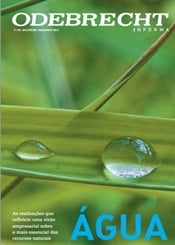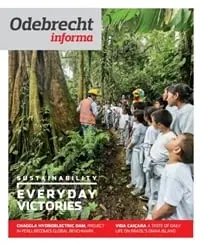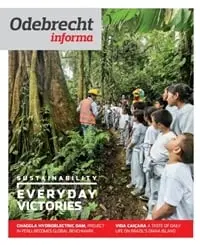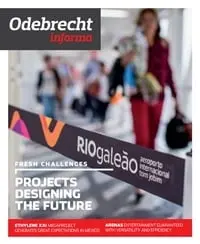Written by: Gabriela Vasconcellos
Photo by: Márcio Lima
In the midst of concrete blocks, cement and sand, Denise Batista’s bright lipstick and loose hair attract attention. At the age of 26, the “pedreirinha” (little bricklayer), as her classmates affectionately call her, is not considered vain. She just likes to stress her femininity. “When I’m in uniform, I look like a man. I want people to see I’m a woman.” A resident of Igrapiúna, Bahia, she joined the inaugural class of Building Better – a project that is part of the Program for Integrated and Sustainable Development of the Mosaic of Environmental Protection Areas in the Southern Bahia Lowlands (PDIS), established by the Odebrecht Foundation. The project is training multiplier agents for the local construction industry.

One of the few women among the 43 apprentices in the first two classes to join the project, Denise had always been curious about her father’s and brother’s profession. “I’m crazy about my job. It’s hard work, but when you do what you love, it gets easy. That’s the choice I’ve made,” she says firmly. According to Christophe Houel, the project’s Educational Leader, Denise’s talent was already clear when they selected the participants. “Today it’s more than proven,” he says.
Denise and her classmates are not only learning to build walls but to develop their civic spirit. “Our challenge is to educate people,” observes Houel. This is the only long-term course of this kind available in Brazil, taught in 18 months through the alternance system. The students spend a week in the classroom learning the theoretical concepts of computer science, Portuguese, math, communications, project design, budgets and career and life plans. During the following three weeks they are given access to practical knowledge on a construction site, under the watchful eyes of educators, supervisors and engineers.
Sponsored by Brazil’s Socioeconomic Development Bank (BNDES), Building Better’s headquarters are under construction in Valença, Bahia, on land donated by the city government. The project will be completed by May 2011. The apprentices are helping build the facility, which will house carpentry and computing labs, a building block factory, classrooms and accommodations. This is just one of the students’ practical experiences. They have also worked in residential construction on a 65-sq.m area of the Nova Igrapiúna subdivision, a factory in the town of Laje, Bahia, and the headquarters of the School of Military Instruction, which is being built as an annex to Youth House State High School in Igrapiúna, an institution that is also linked to the PDIS.
Denise Batista has worked on several projects. Her only complaint about a week of intense work is getting plaster under her nails, one of her few vanities. “This course changed my life. I started out with no expectations. Now I have plans and a vision for the future,” says the “little bricklayer.”
Opportunity
Building Better has given rise to the Construction Cooperative (Coonstruir), an associated entity formed by the apprentices, whose pay is based on their productivity, generating employment and income. The President of Coonstruir is an alumnus of the Youth House State High School. Pedro Rogério da Silva, 25, from Ituberá, Bahia, learned the trade from his father, Raimundo da Silva. “He’s been a supervisor for 30 years. I was born in construction.”
Pedro joined the first class of Building Better. Despite being almost professional, he wanted to improve his skills. Even without the support of his father, who disapproved of his decision to take time off work to study, since it would reduce their income, he decided to keep going. Today, at the end of the course, he makes more than BRL 1,500 a month (almost three times the minimum monthly salary) and is supervising construction of the School of Military Instruction headquarters building. “My father is proud to see me take charge of a job all on my own. Now he wants to work along with me, but I told him it’s time to retire and get some rest. It’s my turn at the wheel,” he says, smiling.
Luan Araújo, 20, shares Pedro Rogério’s dream. “I hope to become a qualified bricklayer, increase my family’s income and give them a better home,” says the Valença resident, who is excited to be an apprentice in the project’s second class.
According to Christophe Houel, the alliance between Building Better and Coonstruir is helping improve the quality of life of the Southern Bahia Lowlands. “We want to provide infrastructure for the region. At the same time, we have to groom multipliers for the construction industry. We are helping many people to get out of a vulnerable situation.”
Dream House
The first Building Better class began its activities in June 2009 and graduated in January 2011. Challenged to present a project that summed up all the knowledge they had acquired, the apprentices developed the Dream House. The idea is to give a Southern Bahia Lowlands family the gift of a decent home. “We developed every step of the project, from the design of the blueprints to a study of the materials required. We split up into teams and went out into the field to interview people. Another part of the group looked for sponsors. We’ll do all the work, and our local partners will donate the materials,” says Denise Batista, who helped devise this initiative.
The chosen family has lived in a mud house for 20 years. The young builders are waiting for the Igrapiúna government to issue the construction permit before they break the news. “I’ve always told them they would be the builders of other people’s dreams. This project proves it. It is the result of being groomed for civic life,” says Laís Freire, Pedagogical Coordinator of Building Better.
A new class will get started in May 2011. To be part of Building Better, applicants must be between 18 and 26 years old. “We don’t want people who already have skills and experience, because our challenge is to provide opportunities for everyone,” emphasizes Christophe Houel.
Building Better’s sponsors
• Odebrecht Foundation
• BNDES
• Senai (National Industrial Education Service)
• Sesi (Social Service for Industry)
• Michelin
• Igrapiúna County
• City of Valença
• Construction Cooperative
• Banco do Nordeste do Brasil
• State of Bahia Construction Union
• Caixa Econômica Federal








